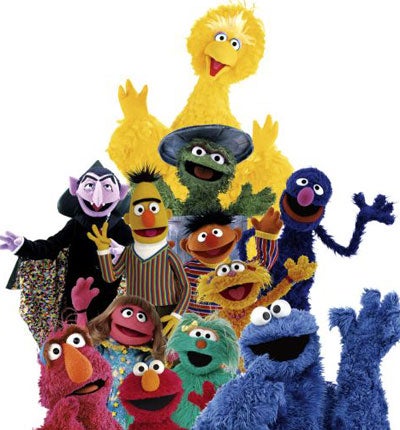Hit & Run: The Big Bird migration

Sesame Street, with its cast of weird monsters with big mouths and bright primary-coloured hides, is not only still thriving, but has gone global almost four decades after its birth. The legendary puppeteer Jim Henson, the alter ego of Kermit the Frog, may have been dead for 18 years, but characters he introduced to Sesame Street as long ago as 1969 - Big Bird, Elmo, Oscar the Grouch, Snuffleupagus and The Cookie Monster – are almost exactly as they were back then, though now they are multilingual.
You can hear them on a double CD and DVD set produced by Putumayo World Music. Billed as "a lively musical journey through Sesame Street productions around the world", it features 13 tracks from versions of the show produced locally in South Africa, Brazil, India, The Netherlands, China, Israel, Tanzania, and other places.
The songs and their accompanying videos worthily reflect preoccupations of the countries where they are made.
South Africa's contribution is the "Pollution song", a hymn to the joys of picking litter off the streets and dropping it in the dustbin. "Here's my solution: we don't want no more pollution" runs the refrain. And who could argue with that?
In Mexico, Plaza Sesamo's mission is to persuade the young to eat more fruit, so that little boys can grow up "big and strong" and little girls can be intelligent princesses. These gender specific aspirations are laid out, in Spanish, in the song "Ricas Frutas" with one line well worth quoting. "A watermelon," it says, "will bring you joy."
In Israel, Ronnie Rock sings a song with the exhortation "let's live in peace with eternal love" while in Russia's Ulitsa Sezam, the human characters serenade the joys of getting up to begin a day's work. "Let the day be peaceful and kind," they ask. From Tanzania, Kilimani Sesame brings you a song with the self-explanatory title "Don't be sad". Those of us with long memories of Jim Henson's creations have just one serious complaint that soils his blessed memory, which was that in 1970, he inflicted a song called "Rubber Duckie" on the record-buying public. Sung by Ernie, in his bath, in tribute to his favourite toy, it reached the charts and followed you everywhere, because it was the sort of jingle that is annoyingly easy to remember. However, if you were by chance one of those peculiar people who actually liked it, there is a real treat in store for you now. You can hear it again, complete with splashing and squeaks, sung in mandarin by one of the cast of Zhima Jie, China's Sesame Street. "Zhou ya ya how bow bow" is how I think the lyrics go, but please don't quote me on that. Anyway, it sounds better than the original.
Fugitives need not apply
The French Foreign Legion has long been the last refuge for scoundrels from all over the world. It has traditionally accepted recruits with no-questions-asked about their past, as long as they are willing to submit themselves to the legendary training regime. However, it seems as if these days are over. According to Captain Samir Benykrelef they no longer "accept the hardened criminals anymore, the murderers or rapists".
Good to know, although one would hope the checks to which new soldiers are now subject also flags up lesser misdemeanours. Toby Green
Coy mistress? Don't believe it
Female coyness is not an expression of inner purity. It's a tactic of scheming women, of any species, when looking for a mate. Biologists from Bristol University have studied mating birds, and believe females play hard to get only so that males will prove themselves more "helpful" parents than rivals. The report makes the distressing observation that, "There are men who have mastered the ability of conning women into thinking they are helpful." You don't say. So for centuries men have been saying, "Sleep with me, Gwendolen, and I'll be really kind to any offspring"? The swine.
John Walsh
Fashion basics + clever marketing = success
Outerwear is rarely glamorous, but the cold snap may go some way towards explaining "double-digit" growth in UK sales at Uniqlo, purveyor of basics with more style than might reasonably be expected. After all, the Japanese company does a nice line in down jackets. But neither is Uniqlo faring badly where international business is concerned: new stores will open next year in Singapore and Russia, and there are currently 54 shops outside Japan. The high-street chain is the budget hot ticket du jour.
Even the company's name – a distillation of "unique" and "clothing" – chimes with the times. Uniqlo sells premium Kaihara denim, cashmere sweaters, fleece tops and more, all designed with an eye for function and at prices that are arrestingly low.
As well as meeting a demand for classics – the economic climate dictates that the ephemeral nature of trend-led fashion is not to be tolerated – the company has lately also been innovative in terms of marketing.
Following its British launch in 2001, by the middle of the decade Uniqlo seemed jaded, and struggled against Topshop, H&M and New Look.
But there's nothing like a clever collaboration with bright young designers, artists and photographers to boost the profile of a faceless corporation, and in 2007 alone Uniqlo produced original T-shirt designs with Nigel Scott, Osamu Tezuka and more. A reversal of fortunes was the result. Today, Uniqlo's timeless design is exactly what the world is looking for.
Susannah Frankel
Subscribe to Independent Premium to bookmark this article
Want to bookmark your favourite articles and stories to read or reference later? Start your Independent Premium subscription today.

Join our commenting forum
Join thought-provoking conversations, follow other Independent readers and see their replies